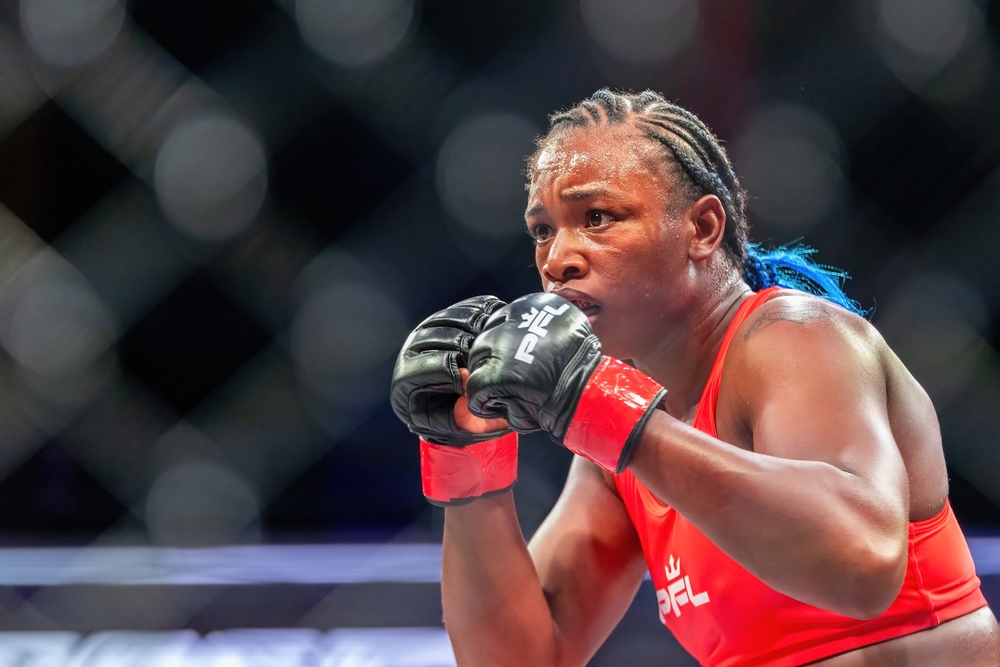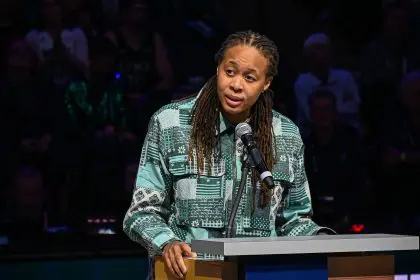Detroit’s Little Caesars Arena will host a compelling heavyweight championship bout as Claressa Shields prepares to defend her title against IBF light heavyweight champion Lani Daniels on July 26, 2025. The matchup represents a significant moment for women’s professional boxing, bringing together two accomplished fighters in what promises to be an entertaining display of skill and determination.
Champion’s impressive credentials
Shields enters the contest with an unblemished professional record of 16 victories without defeat, including three knockouts. Her amateur achievements include two Olympic gold medals, establishing her credentials long before transitioning to professional competition. The 29-year-old has captured championships across three weight divisions, demonstrating versatility and adaptability that few fighters possess.
The Michigan native has consistently advocated for increased recognition of women’s boxing while building her own impressive resume. Her accomplishments extend beyond mere statistics, as she has actively worked to elevate the profile of female competitors in a traditionally male-dominated sport.
Shields’ journey through multiple weight classes has showcased her ability to compete effectively against diverse opponents. Her technical proficiency, combined with natural athleticism, has allowed her to dominate across different divisions while maintaining her undefeated status.
Challenger brings proven experience
Daniels approaches this opportunity with her own compelling credentials, carrying a record of 11 wins, two losses and two draws with one knockout victory. The New Zealand fighter has demonstrated resilience by assembling a seven-fight winning streak, with her most recent defeat occurring in 2022.
Her path to this championship opportunity reflects the competitive nature of women’s boxing at higher weight classes. Daniels has established herself as a legitimate contender through consistent performances and strategic victories against quality opponents.
The challenger’s experience as a two-time world champion provides valuable context for understanding the magnitude of this contest. Her ability to compete at the highest level while maintaining competitive form suggests this bout will test both fighters significantly.
Weight class dynamics shape competition
The current landscape of women’s boxing presents unique challenges and opportunities, particularly in heavier divisions. Competition has intensified as more talented fighters have emerged, creating a more robust competitive environment than existed in previous years.
Shields has navigated these challenges while building her reputation across multiple weight classes. Her experiences at 154, 160 and 168 pounds have provided valuable preparation for heavyweight competition, where different physical demands and strategic considerations apply.
The evolution of women’s boxing has created more opportunities for meaningful competition between elite fighters. This development benefits both competitors and fans, as higher-quality matchups become more frequent and accessible.
Detroit homecoming adds significance
The venue selection adds emotional resonance to this championship defense, as Shields returns to compete in her home state. Little Caesars Arena provides an appropriate stage for a fighter who has represented Michigan with distinction throughout her career.
Local support typically energizes hometown fighters, potentially providing an additional advantage beyond technical preparation and physical conditioning. The familiar environment may contribute to optimal performance when championship pressure reaches its peak.
Detroit’s boxing history includes numerous memorable contests, and this event continues that tradition while showcasing contemporary women’s competition. The city’s sports culture embraces championship-level competition across multiple disciplines.
Professional boxing’s female revolution
This championship contest occurs within a broader transformation of women’s professional boxing. Increased media coverage, improved promotional support and growing fan interest have elevated the sport’s profile significantly in recent years.
Elite female fighters now compete for meaningful purses while receiving appropriate recognition for their accomplishments. This progress reflects changing attitudes toward women’s sports generally and boxing specifically.
The quality of competition continues improving as more athletes choose professional boxing careers. Enhanced training resources, better promotional opportunities and increased financial incentives have attracted superior talent to the sport.
Strategic considerations shape preparation
Both fighters bring distinct advantages to this matchup, creating interesting tactical possibilities for the contest. Shields’ technical proficiency and championship experience contrast with Daniels’ recent momentum and proven resilience.
Championship preparation involves numerous factors beyond physical conditioning, including mental preparation, strategic planning and tactical adjustments. Each fighter’s team will develop specific approaches designed to maximize their athlete’s strengths while addressing potential vulnerabilities.
The heavyweight division requires different strategic considerations compared to lighter weight classes. Power, endurance and ring positioning become increasingly important factors in determining outcomes at this level.
Legacy implications drive motivation
For Shields, this defense represents another opportunity to cement her position among boxing’s elite competitors. Her achievements already place her in exclusive company, but continued success against quality opposition strengthens her historical standing.
Championship longevity requires consistent performance against evolving challenges. Each successful defense adds to a fighter’s legacy while demonstrating sustained excellence over time.
The outcome will influence both fighters’ career trajectories significantly. Victory provides momentum for future opportunities, while defeat necessitates strategic reassessment and tactical adjustments.
This championship bout exemplifies the current state of women’s professional boxing, where talented athletes compete for meaningful titles before appreciative audiences. The contest promises to deliver the excitement and competitiveness that define elite-level competition.














